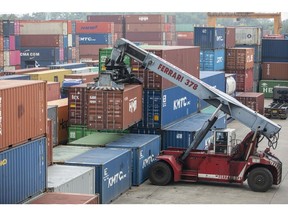
Article content
(Bloomberg) — South Korea’s top trade negotiator continued talks in Washington this week on a $350 billion investment pledge after an unprecedented US immigration raid stoked tensions, fueling debate in Seoul over whether the outlay is worth pursuing.
THIS CONTENT IS RESERVED FOR SUBSCRIBERS ONLY
Subscribe now to read the latest news in your city and across Canada.
- Exclusive articles from Barbara Shecter, Joe O'Connor, Gabriel Friedman, and others.
- Daily content from Financial Times, the world's leading global business publication.
- Unlimited online access to read articles from Financial Post, National Post and 15 news sites across Canada with one account.
- National Post ePaper, an electronic replica of the print edition to view on any device, share and comment on.
- Daily puzzles, including the New York Times Crossword.
SUBSCRIBE TO UNLOCK MORE ARTICLES
Subscribe now to read the latest news in your city and across Canada.
- Exclusive articles from Barbara Shecter, Joe O'Connor, Gabriel Friedman and others.
- Daily content from Financial Times, the world's leading global business publication.
- Unlimited online access to read articles from Financial Post, National Post and 15 news sites across Canada with one account.
- National Post ePaper, an electronic replica of the print edition to view on any device, share and comment on.
- Daily puzzles, including the New York Times Crossword.
REGISTER / SIGN IN TO UNLOCK MORE ARTICLES
Create an account or sign in to continue with your reading experience.
- Access articles from across Canada with one account.
- Share your thoughts and join the conversation in the comments.
- Enjoy additional articles per month.
- Get email updates from your favourite authors.
THIS ARTICLE IS FREE TO READ REGISTER TO UNLOCK.
Create an account or sign in to continue with your reading experience.
- Access articles from across Canada with one account
- Share your thoughts and join the conversation in the comments
- Enjoy additional articles per month
- Get email updates from your favourite authors
Sign In or Create an Account
or
Article content
The push to finalize the agreement reached in July comes as both sides work to move past an the US immigration swoop at an under construction Georgia EV battery run by Hyundai Motor Co.-LG Energy Solution Ltd. After more than 300 Korean workers were detained and later released in the raid, Trade Minister Yeo Han-koo met US Trade Representative Jamieson Greer on Tuesday, following Industry Minister Kim Jung-kwan’s talks with Commerce Secretary Howard Lutnick last week.
Article content
Article content
Article content
Kim also said the outcome of the trade talks will shape Seoul’s future ties with Washington, while admitting he at times questions the value of the investment pledge.
Article content
By signing up you consent to receive the above newsletter from Postmedia Network Inc.
Article content
The back-to-back meetings underscore Seoul’s push to break a deadlock that leaves South Korea’s cars and autoparts at a higher US tariff rate than its regional rival Japan. Auto tariffs have been a sticking point as President Donald Trump is yet to sign the executive order lowering the rate to 15%. The uncertainty has left Korean officials wary of making further commitments without clarity on how duties will be enforced.
Article content
South Korea and the US reached a broad deal setting a 15% tariff on South Korean goods, and their leaders reaffirmed it at a White House summit last month. Still, finalizing the agreement has proven difficult as the sides divided over how to structure and execute the investment package.
Article content
Washington has been pressing for a Japan-style arrangement, a demand Seoul considers politically and economically untenable. South Korea has pushed back against the proposal. Kim Yong-beom, director of national policy at South Korea’s presidential office, said last week that Seoul cannot accept the same terms as Japan’s $550 billion investment pledge, citing the disparity in the size of the two economies and the potential repercussions on the foreign exchange market.
Article content
Article content
Critics argue the investment is disproportionate to the potential benefits. Paying higher tariffs could prove cheaper, as Trump’s 25% duties would cut about 0.7% from South Korea’s GDP in lost exports, far less than the $350 billion investment, Dean Baker, a senior economist at the Center for Economic and Policy Research, said in a note last week.
Article content
“It’s difficult to understand why any country would ever enter into this sort of deal with anyone, especially Donald Trump,” Baker wrote. “They can take one-twentieth the sums being demanded by Trump and use the money to support workers and businesses hurt by the lost exports and come out way ahead.”
Article content
President Lee Jae Myung said last week that the immigration raid could affect future Korean direct investment in the US. Asked whether the detention of workers might influence the negotiations, Yeo said it was an issue Seoul must press firmly. A plane carrying South Korean workers detained in the raid returned to Seoul last week.
Article content
“There seems to be a view even in the US that the response was somewhat excessive,” Yeo, who is scheduled to return home this week, told reporters before leaving for Washington on Monday. “We will do our best to ensure our companies’ interests are reflected.”
Article content

.jpg) 3 hours ago
3
3 hours ago
3
 English (US)
English (US)